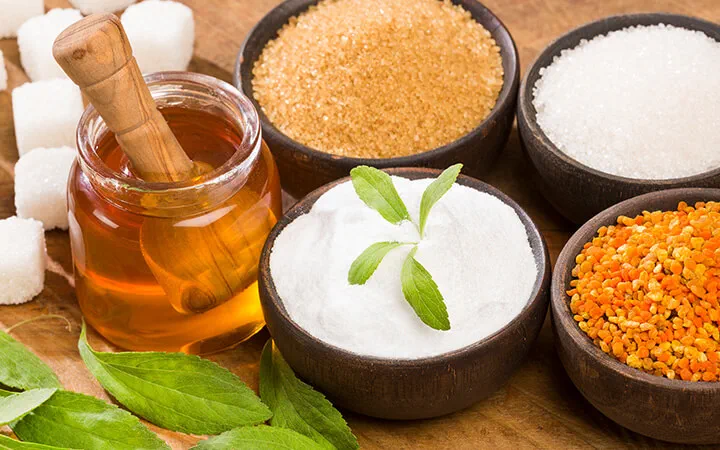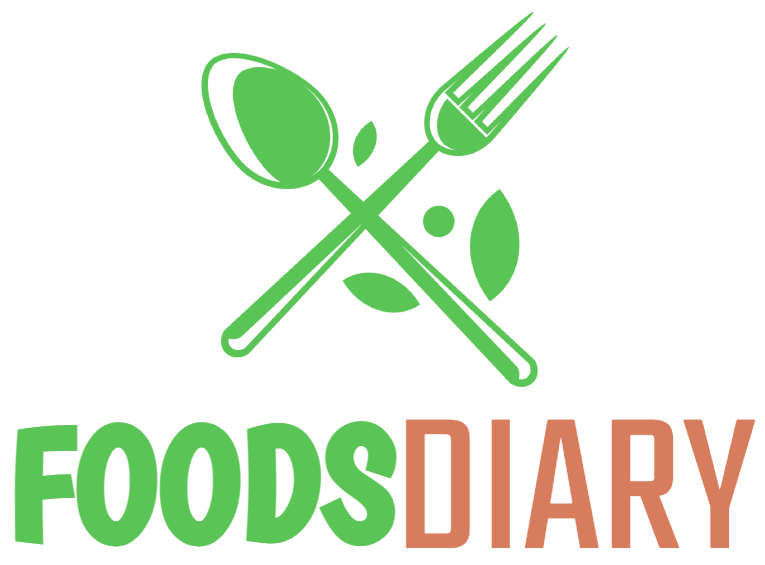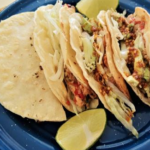If you love sweets but can’t eat them or are looking for a healthier alternative, then this article is for you.
Currently, there is such an immense variety of sweeteners on the food market that it is often overwhelming to choose the right one. However, choosing is not the only problem, since not all of these alternatives are adapted to our particular needs (be it for health, uses or tastes) and sometimes they can even harm us.
For this reason, we bring you this very complete article on the best healthy and natural sugar substitutes so that you have all the necessary information before deciding how to sweeten your day to day.
Sugar – Recommended daily dose
Every day the number of people suffering from diabetes and obesity increases, including children. Much of this problem is due to the indiscriminate consumption of sugars, since many people far exceed the daily requirement.
Sugar is included in many industrial foods that we sometimes don’t even imagine: sauces, ketchup, breads, jellies, puddings, etc. Therefore, it should come as no surprise that we often exceed our daily requirements. According to the WHO, the consumption of refined sugar should not exceed 6 teaspoons per day. This is roughly less than a can of soda.
What is the healthiest sugar?
Currently, there are many alternatives on the market to avoid losing “the sweetness” in our food. The most advisable thing is to explore which option suits us best, evaluating certain very important aspects such as the body’s needs, personal tastes, accessibility to the product, uses or composition.
Although all sugar substitutes have their pros and cons, two of them have properties that make them suitable for any type of diet and body: bacon and stevia. Both sweeteners are safe for diabetics, children and pregnant women. In addition, we can also include the sugar contained in the tubers and fruits in their natural state and free from industrial processes. All this makes us group them among the healthiest sugar substitutes.
Natural stevia
In nature, stevia is found in leaves, which contain 11 sweet compounds called stevia glycosides. So far, in most studies, it is reflected that stevia provides many benefits, since it contains few calories, does not affect blood glucose levels, does not cause allergies and contains antibacterial properties. For this reason, it is ideal for diabetics, pregnant women, children, people who want to lose weight and people with allergies.
Equivalences to replace sugar with stevia
Stevia is even sweeter than sugar (it is estimated that around 100-300 times more), but it provides 0 calories. The following equivalences are used both for baking recipes and to sweeten drinks and coffee, so it is an excellent alternative if you are looking for a substitute for sugar in baking for diabetics.
- 1 cup of sugar = 1 tsp. of powdered or liquid stevia.
- ½ cup of sugar = ½ tsp. of powdered or liquid stevia.
- 1 tbsp. of sugar = 1/4 tsp. of powdered stevia or 6 drops of liquid stevia.
- 1 tsp. sugar = 2 drops of liquid stevia or a pinch of powdered stevia.
Bacon syrup
The bacon is a tuber of Andean origin that was already used by the native peoples as food and medicine. Today, bacon is traded internationally as a natural sweetener, although it is not yet popular enough.
It contains inulin, potassium, and vitamins A, C, and E, which give it prebiotic properties, in addition to helping fight diabetes, prevent digestive diseases, lower cholesterol, and prevent obesity. Therefore, it can be consumed by anyone, including pregnant women and diabetics.
Equivalence to substitute cane sugar for bacon syrup: In confectionery, the equivalent is 1 cup of sugar = ¾ of bacon syrup.
Fruits and vegetables
If you choose fruits or vegetables, you will enjoy many natural sugars and nutrients, without chemical additives. You can prepare them as juices, purees or syrups; this way you will turn them into natural sweeteners, very healthy and effective. Fruits are sources of fiber, vitamins, minerals and antioxidants. In addition, they do not contain chemical additives and, when consumed in juices or purees, they retain a large part of their properties.
It is important to note that people with diabetes should always consult their doctor to find out the correct amount of fruit they can eat. This is because some fruits and vegetables are very high in sugars and carbohydrates, so they should be used sparingly. Equivalence to substitute cane sugar for fruit or vegetables:
In this case, if you sweeten a drink, you can be guided by its taste to know the correct amount. If we talk about preparing a dessert to bake, things change, since the measurements matter a lot.
- If you need 1 cup of sugar, it would be 1/2 cup of sugar (refined or very similar sweetener) plus ½ cup of fruit compote.
- If you decide to just use compote or puree, make up for the extra moisture with more dry ingredients like flour or nuts.
Sugar substitutes for diabetics
Knowing how to substitute sugar is helpful in any diet, but this is especially relevant for those with diabetes or prediabetes. In these cases, low-carbohydrate sweeteners should be sought that do not alter glucose levels in the body.
The first two options that we will give you are perfect for diabetic diets and diets, while the third, despite being beneficial for people with diabetes, should be consumed in moderation.
Birch sugar or xylitol
Xylitol is a sugar alcohol, used as an alternative sugar to refined sugar. This sweetener is extracted from vegetables and fruits such as plums, cauliflower and berries, as well as grains such as corn.
City has 40% fewer calories than refined sugar, doesn’t raise blood sugar levels when eaten, and doesn’t cause cavities. For that reason, anyone can consume erythritol, even diabetics, as it does not affect the body’s glucose.
Equivalence to substitute cane sugar for birch or xylitol:
- 1 tbsp. of birch or xylitol sugar = 1 tbsp. of cane sugar.
Erythritol
This sweetener comes from foods such as strawberries, grapes, melons, pears, corn and mushrooms. Erythritol is created with the fermentation of glucose from these foods and, in its characteristics, closely resembles birch.
Erythritol has a very low caloric value, does not cause cavities, reduces dental plaque, produces less intestinal pain than other sugar alcohols and does not contain carbohydrates. In addition, it causes a lower reaction of glucose and insulin in the blood compared to other sugars. Therefore, it is an excellent sweetener for diabetics.
However, its excessive use also has side effects such as diarrhea, digestive discomfort, abdominal distention, stomach pain and headache.
Equivalence to substitute cane sugar for erythritol:
Erythritol is less sweet than sugar, so you must add 25% more of this sweetener to achieve a taste similar to refined sugar:
- For every 1 tbsp. of sugar = 1 ½ tbsp. of erythritol.
Maple syrup
Maple syrup, also called maple syrup or maple syrup, is extracted from the maple tree. This product, originally from Canadian forests, is prepared with the sap of this tree. Its extraction and production process, if it is authentic maple syrup, is quite natural.
This sweetener is an excellent energizer and has antioxidant and anti-inflammatory properties. However, it is rich in carbohydrates, so diabetics should eat it in moderation. Despite this, it brings many benefits to those who suffer from diabetes, since its glycemic index is low and it contains many antioxidants.
Equivalence to substitute cane sugar for maple syrup: Since maple syrup is much sweeter than sugar, the ratio looks like this:
- 1 tbsp. of cane sugar = 1/3 tbsp. of maple.
Sugar substitutes for baking
When it comes to finding sugar substitutes in baking, it is important to look for ingredients that do not alter the properties of the recipes. In addition, it is convenient to use sweeteners whose flavors and essences combine very well with the rest of the elements of the biscuits or desserts that you want to prepare. In addition to fruits, which are excellent substitutes for sugar in desserts, here are other alternatives to replace sugar without giving up its sweetness.
Honey
Honey is a highly appreciated ancient ingredient, due to its multiple properties for beauty, health and gastronomy. In the culinary world, this sweetener is recognized as an infallible classic ingredient in the kitchen, very versatile in its uses and very tasty.
Although honey is considered a healthy sugar, it contains almost the same calories and carbohydrates as white sugar. Therefore, it is not recommended for diabetics or anyone on a slimming diet. In addition, although it is a natural sugar, insects are involved in its production, which is why it is not included in vegan diets either.
Equivalences to replace sugar with honey:
The following equivalences serve you both for confectionery and to sweeten drinks and coffee.
- 1 cup of sugar = 3/4 of a cup of honey (less honey is always used than sugar, so the flavor of the recipe to be prepared is not altered).
- 1 tbsp. of sugar = 3/4 of a tbsp. of honey.
- 1 tsp. sugar=1/2 tsp. honey.
Pamela (piloncillo or paper)
Papillion, piloncillo or panel (as many know it) is simply sugar cane syrup (unrefined white sugar). This product, during its preparation, is not subjected to any chemical process or refinement, which is why it is considered healthy. In addition, panel has properties that help reduce the appearance of cavities, combat anemia and promote metabolic activities.
However, panel is not recommended for people with high triglycerides, overweight, obesity and diabetes. The rest of the people can use it normally in their daily diets, always remembering that it is sugar, less refined and healthier, but sugar after all.
Equivalence to substitute cane sugar for panel:
If you prepare homemade piloncillo syrup or honey, you can easily sweeten many drinks and desserts. Whenever you use paper, whether dry or in molasses, you must take into account its moisture content and its characteristic flavor, especially if you use it in confectionery. So, the standard measure to substitute the sugar would look like this:
- For a 1 serving of sugar, its equivalence would be 2/3 of panel (for example, 1 cup of sugar would be 2/3 of a cup of paper).
Agave syrup
This molasses comes from the agave pecans (plant similar to the cactus). Agave syrup is made up of sugars such as fructose, glucose and fructooligosaccharides. It has a low glycemic index unlike cane sugar, although its fructose concentration is high. In addition, it provides a lot of energy, lowers cholesterol, has anti-inflammatory properties and strengthens the immune system.
This syrup contains almost the same calories as honey and white sugar, which is why it is not recommended for slimming diets or for diabetics.
Equivalence to substitute cane sugar for agave syrup:
You can use this sweetener in both beverages and pastries. Its flavor is sweeter than refined sugar, which requires a smaller dose, therefore:
- 1 cup of sugar = ¾ cup of agave.
Other natural and healthy sugar substitutes
If you want to know more natural sugar substitutes to find your favorite, we recommend you try some of these alternatives to sugar:
Coconut sugar
Coconut sugar comes from the nectar of the coconut flower and not from the fruit, as many people believe. In its flavor, the coconut is not detected (because it comes from the flower), rather it tastes slightly caramelized. In addition, coconut sugar is an organic ingredient because its cultivation respects the environment, which is why it is considered the most sustainable sweetener in the world, declared this way by the Food and Agriculture Organization of the United Nations.
Coconut sugar regulates the absorption of glucose, lowers cholesterol, favors the intestinal flora and improves the absorption of minerals and vitamins; all these benefits are the result of its inulin content. However, its fructose levels are high, which is why it can cause significant long-term damage to the body. With the exception of diabetics, people looking to lose weight, and individuals with fatty liver, anyone can consume coconut sugar.
Both in the kitchen and in baking, coconut sugar fulfills almost the same functions as cane sugar. In addition, it sweetens in a very similar way. Therefore, it is logical that the equivalence to substitute sugar with coconut sugar is the following:
- 1 tbsp. of coconut sugar = 1 tbsp. of refined cane sugar.
Rice molasses
Rice molasses (honey, syrup or rice malt) is a natural sweetener that can be obtained by cooking brown rice. In other cases, it is done through fermentation, a technique that converts the final product into a more digestible ingredient that retains most of its nutrients (vitamins and minerals).
Rice molasses produces a greater feeling of satiety with fewer calories than refined sugar. In addition, it is ideal for vegans, as it is excellent to replace honey. It is not recommended for diabetics and celiac.
Equivalence to replace cane sugar with molasses and rice:
Rice molasses is less sweet than regular sugar, so you need to double the amount of it:
- 1 tablespoon of cane sugar = 2 tablespoons of rice molasses.
- 1 tbsp. of honey = 1 tbsp. of rice molasses.



